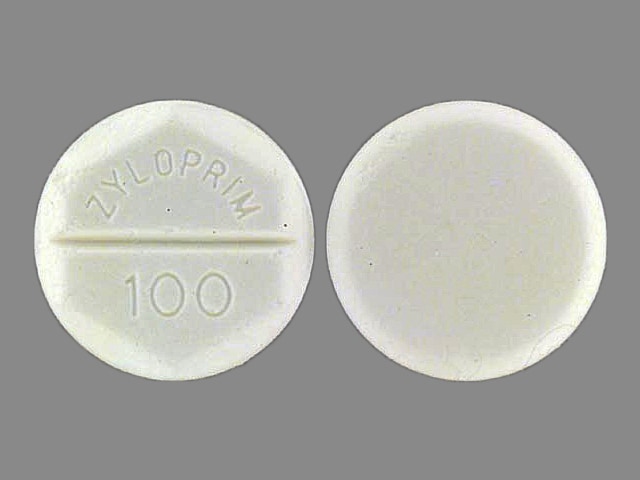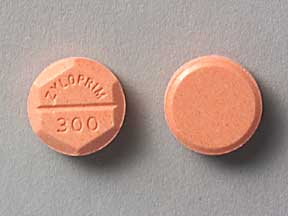Zyloprim
Generic name: Allopurinol Tablets
Drug classes: Antigout agents, Antihyperuricemic agents
Medically reviewed by A Ras MD.
What is Zyloprim used for?
Zyloprim is used to lower uric acid in the blood. It is used to prevent high uric acid levels during chemo. Zyloprim may be given to you for other reasons.
Description
ZYLOPRIM (allopurinol) has the following structural formula:

ZYLOPRIM is known chemically as 1,5-dihydro-4H-pyrazolo [3,4- d]pyrimidin-4-one. It is a xanthine oxidase inhibitor which is administered orally. Each scored white tablet contains 100 mg allopurinol and the inactive ingredients lactose, magnesium stearate, potato starch, and povidone. Each scored peach tablet contains 300 mg allopurinol and the inactive ingredients corn starch, FD&C Yellow No. 6 Lake, lactose, magnesium stearate, and povidone. Its solubility in water at 37°C is 80.0 mg/dL and is greater in an alkaline solution.
Before taking Zyloprim, tell your doctor:
- If you are allergic to Zyloprim; any part of this medicine; or any other drugs, foods, or substances. Tell your doctor about the allergy and what signs you had.
This medicine may interact with other drugs or health problems.
Tell your doctor and pharmacist about all of your drugs (prescription or OTC, natural products, vitamins) and health problems. You must check to make sure that it is safe for you to take Zyloprim with all of your drugs and health problems. Do not start, stop, or change the dose of any drug without checking with your doctor.
What are some things I need to know or do while I take Zyloprim?
- Tell all of your health care providers that you take Zyloprim. This includes your doctors, nurses, pharmacists, and dentists.
- Avoid driving and doing other tasks or actions that call for you to be alert until you see how Zyloprim affects you.
- Have blood work checked as you have been told by the doctor. Talk with the doctor.
- Follow the diet and workout plan that your doctor told you about.
- A severe and sometimes deadly reaction has happened. Most of the time, this reaction has signs like fever, rash, or swollen glands with problems in body organs like the liver, kidney, blood, heart, muscles and joints, or lungs. If you have questions, talk with the doctor.
- It may take several weeks to see the full effects.
- The chance of gout attacks may be higher for a few months after you start taking Zyloprim. Do not stop taking Zyloprim. You may be given other drugs to help you keep from getting gout attacks. Talk with your doctor.
- Tell your doctor if you are pregnant or plan on getting pregnant. You will need to talk about the benefits and risks of using Zyloprim while you are pregnant.
- Tell your doctor if you are breast-feeding. You will need to talk about any risks to your baby.
How is Zyloprim best taken?
Use Zyloprim as ordered by your doctor. Read all information given to you. Follow all instructions closely.
- Take after meals.
- Keep taking Zyloprim as you have been told by your doctor or other health care provider, even if you feel well.
- Keep taking Zyloprim even if you are having a gout attack.
- Drink lots of noncaffeine liquids unless told to drink less liquid by your doctor.
What do I do if I miss a dose?
- Take a missed dose as soon as you think about it.
- If it is close to the time for your next dose, skip the missed dose and go back to your normal time.
- Do not take 2 doses at the same time or extra doses.
What are the side effects of Zyloprim that I need to call my doctor about immediately?
WARNING/CAUTION: Even though it may be rare, some people may have very bad and sometimes deadly side effects when taking a drug. Tell your doctor or get medical help right away if you have any of the following signs or symptoms that may be related to a very bad side effect:
- Signs of an allergic reaction, like rash; hives; itching; red, swollen, blistered, or peeling skin with or without fever; wheezing; tightness in the chest or throat; trouble breathing, swallowing, or talking; unusual hoarseness; or swelling of the mouth, face, lips, tongue, or throat.
- Signs of kidney problems like unable to pass urine, change in how much urine is passed, blood in the urine, or a big weight gain.
- Pain when passing urine.
- Back pain, belly pain, or blood in the urine. May be signs of a kidney stone.
- Eye irritation.
- Change in eyesight.
- Joint pain that is new or worse.
- Swollen gland.
- Shortness of breath, a big weight gain, or swelling in the arms or legs.
- Chest pain or pressure.
- Liver problems have happened with Zyloprim. Sometimes, liver problems have not gone back to normal after Zyloprim was stopped. Call your doctor right away if you have signs of liver problems like dark urine, feeling tired, not hungry, upset stomach or stomach pain, light-colored stools, throwing up, or yellow skin or eyes.
- A very bad skin reaction (Stevens-Johnson syndrome/toxic epidermal necrolysis) may happen. It can cause very bad health problems that may not go away, and sometimes death. Get medical help right away if you have signs like red, swollen, blistered, or peeling skin (with or without fever); red or irritated eyes; or sores in your mouth, throat, nose, or eyes.
- Low blood cell counts have happened with Zyloprim. Most of the time, this happened in people who were also taking other drugs that can cause low blood cell counts. Call your doctor right away if you have any signs of infection like fever, chills, or sore throat; any unexplained bruising or bleeding; or you feel very tired or weak.
What are some other side effects of Zyloprim?
All drugs may cause side effects. However, many people have no side effects or only have minor side effects. Call your doctor or get medical help if any of these side effects or any other side effects bother you or do not go away:
- Diarrhea.
- Upset stomach.
These are not all of the side effects that may occur. If you have questions about side effects, call your doctor. Call your doctor for medical advice about side effects.
You may report side effects to the FDA at 1-800-332-1088. You may also report side effects at https://www.fda.gov/medwatch.
If overdose is suspected:
If you think there has been an overdose, call your poison control center or get medical care right away. Be ready to tell or show what was taken, how much, and when it happened.
How do I store and/or throw out Zyloprim?
- Store at room temperature.
- Protect tablets from light.
- Store in a dry place. Do not store in a bathroom.
- Keep all drugs in a safe place. Keep all drugs out of the reach of children and pets.
- Throw away unused or expired drugs. Do not flush down a toilet or pour down a drain unless you are told to do so. Check with your pharmacist if you have questions about the best way to throw out drugs. There may be drug take-back programs in your area.
Label
PACKAGE LABEL.PRINCIPAL DISPLAY PANEL
- ZYLOPRIM® (allopurinol)
- 100 mg 90 Tablets Bottle
- NDC 70199-015-90
- Rx Only


ZYLOPRIM® (allopurinol)
- 300 mg 90 Tablets Bottle
- NDC 70199-016-90
- Rx Only

SRC: NLM .

